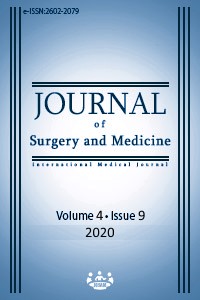The effects of age, parity and body mass index on 50 g oral glucose tolerance test results and its predictive value in gestational diabetes mellitus
Keywords:
oral glucose tolerance test, diabetes, obesity, advanced maternal ageAbstract
Aim: The aim of this study was to investigate the effects of age, parity, body mass index (BMI) and maternal risk factors on 50 g oral glucose tolerance test (OGTT) positivity and to evaluate the predictive value of 50 g OGTT in the diagnosis of gestational diabetes mellitus (GDM). Methods: Medical data of pregnant women who were followed in a private obstetrics and gynecology clinic between June 2012 and April 2020 were analyzed in this retrospective cohort study. All patients underwent 50 g OGTT between 24 and 28 weeks of gestation. A 1-h postprandial venous plasma glucose cut-off of ≥140 mg/dL was considered positive for OGTT and the diagnosis was confirmed by 2-h 75 g OGTT. The relationship between the GDM and OGTT results, BMI, parity, age, and other maternal risk factors was analyzed in the regression analysis. Results: A total of 323 pregnant women were included in the study. The mean age was 29.35 (5.29) years and the mean BMI was 27.23 (6.07) kg/m2. Among them, 35.9% had ≥1 risk factors. The sensitivity, specificity, positive predictive value, and negative predictive value of 50 g OGTT for GDM were 100%, 80.7%, 27.5%, and 100%, respectively. Regression analysis revealed that family history of diabetes, history of GDM, and macrosomic birth increased the GDM risk by 5.73, 4.95, and 1.43 folds, respectively. Conclusion: Evaluation of advanced maternal age, pre-pregnancy BMI, and maternal risk factors is useful to predict GDM. In addition, 50 g OGTT is helpful in diagnosing GDM for both maternal and fetal health.
Downloads
References
Kampmann U, Madsen LR, Skajaa GO, Iversen DS, Moeller N, Ovesen P. Gestational diabetes: a clinical update. World J Diabetes. 2015;6(8):1065. doi: 10.4239/wjd.v6.i8.1065
Menato G, Bo S, Signorile A, Gallo ML, Cotrino I, Poala CB, et al. Current management of gestational diabetes mellitus. Expert Review of Obstetrics & Gynecology. 2008;3(1):73-91. doi: 10.1586/17474108.3.1.73
Lee KW, Ching SM, Ramachandran V, Yee A, Hoo FK, Chia YC, Sulaiman WAW, et al. Prevalence and risk factors of gestational diabetes mellitus in Asia: a systematic review and meta-analysis. BMC Pregnancy Childbirth. 2018;18(1):494. doi: 10.1186/s12884-018-2131-4.
Bardenheier BH, Elixhauser A, Imperatore G, Devlin HM, Kuklina EV, Geiss LS et al. Variation in prevalence of gestational diabetes mellitus among hospital discharges for obstetric delivery across 23 states in the United States. Diabetes Care. 2013;36(5):1209-14. doi: 10.2337/dc12-0901.
Lindqvist M, Persson M, Lindkvist M, Mogren I. No consensus on gestational diabetes mellitus screening regimes in Sweden: pregnancy outcomes in relation to different screening regimes 2011 to 2012, a cross-sectional study. BMC Pregnancy Childbirth. 2014;14(1):185. doi: 10.1186/1471-2393-14-185
Öztürk FY, Altuntas Y. Gestational diabetes mellitus. Şişli Etfal Hastanesi Tip Bülteni. 2015;49(1):1-10. doi: 10.5350/SEMB.20150317014238.
Shrestha A, Chawla C. The glucose challenge test for screening of gestational diabetes. Kathmandu Univ Med J. 2011;9(2):22-5.
Bayram M, Biri A, Büyükbayrak EE, Dağlar K, Ercan F, Erzincan SG, et al. Perinatoloji Uzmanlari Derneği Gebelik Ve Diyabet Kilavuzu. 2019. http://puder.org.tr/wp-content/uploads/2019/12/PUDER-Gebelik-ve-Diyabet-K%C4%B1lavuzu-6.10.2019.pdf
HAPO Study Cooperative Research Group; Metzger BE, Lowe LP, Dyer AR, Trimble ER, Chaovarindr U, Coustan DR, et al. Hyperglycemia and adverse pregnancy outcomes. N England J Med. 2008;358(19):1991-2002. doi: 10.1056/NEJMoa0707943.
Nielsen KK, Kapur A, Damm P, Courten M, Bygbjerg IC. From screening to postpartum follow-up–the determinants and barriers for gestational diabetes mellitus (GDM) services, a systematic review. BMC Pregnancy Childbirth. 2014;14(1):41. doi: 10.1186/1471-2393-14-41.
Neelakandan R, Sethu PS. Early universal screening for gestational diabetes mellitus. J Clin Diagn Res. 2014;8(4):OC12-4. doi; 10.7860/JCDR/2014/8199.4264.
de Sereday MS, Damiano MM, Gonzalez CD, Bennett PH. Diagnostic criteria for gestational diabetes in relation to pregnancy outcome. J Diabetes Complications. 2003;17(3):115-9. doi: 10.1016/s1056-8727(02)00173-3.
İnan C, Ağır MÇ, Sağır FG. Efficacy of 50-G Glucose Challenge Test in The Diagnosis of Gestational Diabetes Mellitus. Medical Bulletin of Haseki. 2014;52(3).
Gülbahar Ö, Çaycı AB, Budakoğlu İ, Erçin U, Bukan N, Paşaoğlu H, et al. Gestasyonel Diabetes Mellitus Tanısı İçin OGTT Değerlendirmesinde ADA Kriterlerinin Yeri. Türk Klinik Biyokimya Derg. 2010;8(2):63-7.
Abu-Heija AT, Al-Bash MR, Al-Kalbani MA. Effects of maternal age, parity and pre-pregnancy body mass index on the glucose challenge test and gestational diabetes mellitus. J Taibah Univ Med Sci. 2017;12(4):338-42. doi: 10.1016/j.jtumed.2017.01.005
Kutay NG, Gönenç G, İşçi H, Yiğiter AB, Dünder İ. Gestasyonel diabetes mellitus riskinin maternal yaş ve gebeliğin başlangıcındaki vücut kitle indeksi ile ilişkisi. Dicle Tıp Dergisi. 2013;40(3):406-9. doi: 10.5798/diclemedj.0921.2013.03.0298
Far MA, Ziaei S, Kazemnejad A. The impact of maternal age, pre-pregnancy body mass index, weight gain and parity on glucose challenge test (GCT). Int J Fertil Steril. 2012;5(4):207-10.
Pridjian G, Benjamin TD. Update on gestational diabetes. Obstet Gynecol Clin North Am. 2010;37(2):255-67.
Al-Khaduri MM, Abudraz RM, Rizvi SG, Al-Fasri Y. Risk factors profile of shoulder dystocia in Oman: a case control study. Oman Med J. 2014;29(5):325. doi: 10.5001/omj.2014.88.
Catalano P. Trying to understand gestational diabetes. Diabet Med. 2014;31(3):273-81. doi: 10.1111/dme.12381.
Sagün M, Tosun M, Malatyalı E, Çetinkaya MB, Alper T, Kökçü A. Gestasyonel diabet taramasında 50 gr oral glukoz testinin etkinliği. J Turk Soc Obstet Gynecol. 2008;5(4):258-62.
Downloads
- 1412 909
Published
Issue
Section
How to Cite
License
Copyright (c) 2020 Alparslan Deniz
This work is licensed under a Creative Commons Attribution-NonCommercial-NoDerivatives 4.0 International License.
















